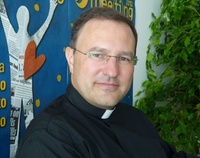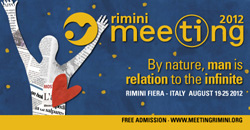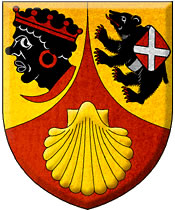 We continually need to get to the heart of who our influences are as people. That is true of Father Luigi Giussani who is being spoken of not only as the founder of the ecclesial movement of Communion and Liberation but also because his cause for canonization is now being studied. Father Ignacio Carbajosa Pérez, 45, said of Father Luigi
Giussani, "For me the most striking thing was to hear this man with this love
for my humanity, finally, to find someone who knew very well what is my
humanity and then looked upon it in a sympathetic way." (Read more of what Father Ignacio told David Kerr here at The Rimini Meeting 2012.)
We continually need to get to the heart of who our influences are as people. That is true of Father Luigi Giussani who is being spoken of not only as the founder of the ecclesial movement of Communion and Liberation but also because his cause for canonization is now being studied. Father Ignacio Carbajosa Pérez, 45, said of Father Luigi
Giussani, "For me the most striking thing was to hear this man with this love
for my humanity, finally, to find someone who knew very well what is my
humanity and then looked upon it in a sympathetic way." (Read more of what Father Ignacio told David Kerr here at The Rimini Meeting 2012.)Communion & Liberation: August 2012 Archives
 We continually need to get to the heart of who our influences are as people. That is true of Father Luigi Giussani who is being spoken of not only as the founder of the ecclesial movement of Communion and Liberation but also because his cause for canonization is now being studied. Father Ignacio Carbajosa Pérez, 45, said of Father Luigi
Giussani, "For me the most striking thing was to hear this man with this love
for my humanity, finally, to find someone who knew very well what is my
humanity and then looked upon it in a sympathetic way." (Read more of what Father Ignacio told David Kerr here at The Rimini Meeting 2012.)
We continually need to get to the heart of who our influences are as people. That is true of Father Luigi Giussani who is being spoken of not only as the founder of the ecclesial movement of Communion and Liberation but also because his cause for canonization is now being studied. Father Ignacio Carbajosa Pérez, 45, said of Father Luigi
Giussani, "For me the most striking thing was to hear this man with this love
for my humanity, finally, to find someone who knew very well what is my
humanity and then looked upon it in a sympathetic way." (Read more of what Father Ignacio told David Kerr here at The Rimini Meeting 2012.) THE most significant cultural and religious meeting in the world is held in the late August: "Rimini Meeting" in the seaside town of Rimini (Italy). From 19-25 August, The Meeting coordinated by members of Communion and Liberation attracts numerous speakers and more than 800K.
THE most significant cultural and religious meeting in the world is held in the late August: "Rimini Meeting" in the seaside town of Rimini (Italy). From 19-25 August, The Meeting coordinated by members of Communion and Liberation attracts numerous speakers and more than 800K.The Holy Father, Pope Benedict closely follows The Meeting. He was in attendance several years ago, as was John Paul II in 1982. Picking up from Father Luigi Giussani's thinking of "life as a vocation", the Pope reminds us that everything is answered in relationship to the Infinite. On July 11, 2012 I posted a piece called "The Vocation to Life" which is essential reading if you want to know more of what the Pope, Giussani and Christianity is all about.
The Pope's letter for the 2012 Meeting follows (emphasis mine).
To the Venerable Brother Monsignor Francesco Lambiasi,

I wish to extend my cordial greetings to you, to the organizers and to all the participants in the Meeting for Friendship among Peoples, now in its XXXIII year. The theme chosen this year - "The nature of man is a relationship with the infinite" - is particularly significant in view of the approaching start of the Year of Faith, which I have willed to proclaim to mark the 50th anniversary of the opening of the Second Vatican Ecumenical Council.
To speak of man and of his yearning for the infinite means, first and foremost, to recognize his constitutive relationship with the Creator. Man is a creature of God. Today this word - creature - seems almost passé: we prefer to think of man as a self-fulfilled being and master of his own destiny. The consideration of man as a creature seems "uncomfortable," because it implies an essential reference to something else, or better, to Someone else - whom man cannot control - who enters in order to define his identity in an essential way; a relational identity, whose first element is the original and ontological dependence on He who wanted us and created us. Yet this dependence, from which modern and contemporary man attempts to break free, not only does not hide or diminish, but luminously reveals the greatness and supreme dignity of man, who is called into life in order to enter into relationship with Life itself, with God.



